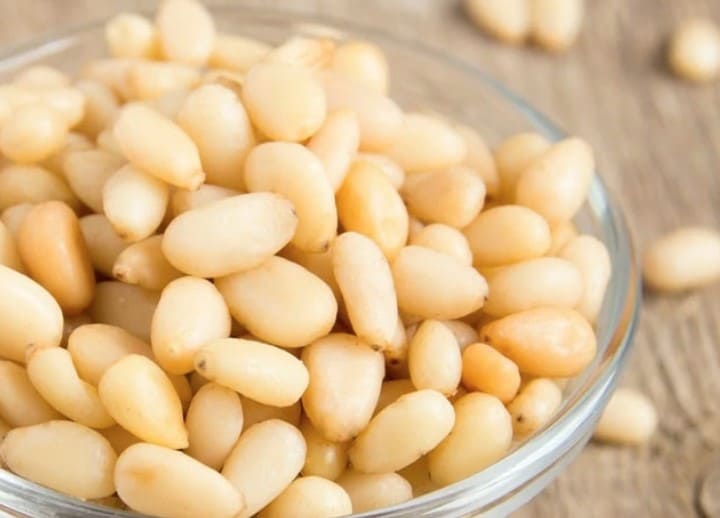Of the approximately 80 pine species worldwide, about 12 edible seeds ripen. The ivory-colored pine nuts or pignoli are stuck in the cones of the trees, also known as umbrella pines. This wild pine species grows up to 30 meters high. To harvest, the cones are stripped from the tree and left to dry in the sun. They open up, the seeds can be taken out and then detached from their shell.
Origin
The original origin of the pine is believed to be in Asia Minor. Today, the different types of pine grow around the Mediterranean, in China, on the Canary Islands, in Pakistan and South America. The best quality pine nuts come from Tuscany.
Season
The harvest takes place from October to March, but pine nuts are available all year round.
Taste
Pine nuts taste sweet, mildly resinous, delicately nutty, and almond-like.
Use
The kernels are very popular in oriental and Mediterranean cuisine, where they are used for many meat, poultry, and vegetable dishes. They are an important ingredient in the famous Ligurian pesto. Pine nuts are suitable for sprinkling on salads and fruit salads, for baking, and for rice dishes. Roasting enhances their aroma!
Storage/shelf life
The fat-rich kernels must be stored in a dry, airy, and cool place. Peeled kernels can be kept well wrapped for 2-3 months.
Nutritional value/active ingredients
With around 575 kcal/2408kJ per 100 g, pine nuts are very rich in energy. The reason is their fat content of around 50%. However, the proportion of valuable monounsaturated and polyunsaturated fatty acids, such as the omega-3 fatty acid alpha-linolenic acid, is very large. They also provide vitamin B1, vitamin E, niacin, folic acid, and biotin as well as iron, zinc, potassium, magnesium, and phosphorus. Vitamin E helps protect cells from oxidative stress. Iron and folic acid support normal blood formation, magnesium, and zinc the maintenance of normal bones. Phosphorus, vitamin B1, and niacin contribute to normal energy metabolism and biotin to the maintenance of normal hair. Potassium helps maintain normal blood pressure.



